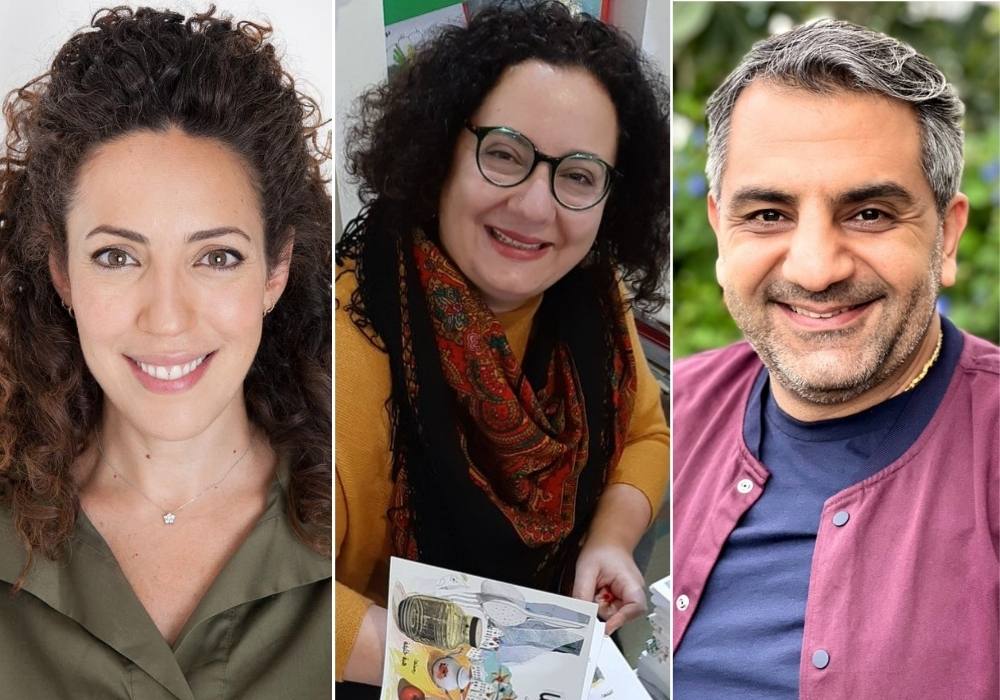Ours is an age when criticism often celebrates fat-free sentences, restrained ironies, and hope that’s caged in self-awareness—novels that walk before us like sunken-cheeked, unsmiling catwalk models. Huzama Habayeb’s Velvet, by contrast, is unafraid of its fullness: its gold jewelry, its fleshy abundance, its black velvet, and most of all, its melancholic and romantic lyrics, as sung by legendary Lebanese diva Fairouz. Velvet is a novel crammed with love and loss as it follows the gripping late-in-life love story of Hawwa and Munir, Palestinian refugees living in Jordan’s Baqa’a camp. Yet as their romance unfolds, Habayeb casts a wider look at the world around them, deftly inscribing and disassembling powerful mythologies of motherhood and exile.
Velvet, which won the 2017 Naguib Mahfouz Medal for Literature, is a multigenerational novel with a wide cast of characters. Yet it is Hawwa’s story from beginning to end. “Hawwa” is the Arabic word for “Eve,” an allusion that, unfortunately, isn’t carried into Kay Heikkenen’s able translation. Although born in poverty and exile, Hawwa has talent. She is attractive, strong, and clever; she is a gifted dressmaker. We might expect that she or her children will rise up from poverty, or that motherhood and hard work will have rewards. Yet Habayeb confounds any such expectations.
As the novel opens, the rain is coming down as though sent by God. This rain hurls itself into the action, much as all of Habayeb’s characters do: “Daggers of water pierced the dusty flanks of the ground, thrusting rapidly and in quick succession, as if laden with emotion, or haunted by ancient sorrow, or filled with deeply buried rancor.” The rain is not just one thing, but a hundred, and it “poured down like a hail of bullets on terrified windows.”
This sensory-overload precipitation doesn’t stop for seven days. “At times the rain was rushed, as if it wanted to empty everything in the womb of the sky and be done at last with its burden, or perhaps its sin. At other times it slowed, as if its will were feeble, the space between one raindrop and the next becoming wider and longer, as if the sky’s mouth had gone dry, before the water once again reclaimed its anger, its lash, and its bluster.”
While others are huddled in their homes, middle-aged Hawwa rejoices in the rain. After all, the rain gives cover to her romantic transgressions, although we don’t yet know that. Before we get too far, she remembers an expression of her father’s, and we are yanked back into her freezing childhood of violence and toil, unrelieved by affection. Daily, we see Hawwa protect her late-blooming brother Ayid. She washes his urine-soaked sheets and throws herself over his body to take his beatings. Yet there is no one who protects Hawwa; she is treated as a mature woman and a mother figure from the tender age of eleven.
Hawwa finds some relief in working as an apprentice seamstress for Sitt Qamar, who, unlike Hawwa, lives outside the camp. Here, Hawwa is respected, learns a trade, and has her first crush. To young Hawwa, Sitt Qamar seems to have the ideal life—that of a respectable businesswoman who is husband- and child-free—but she later uncovers Sitt Qamar’s secret, passionate grief.
All the novel’s most beautiful literary allusions and quotations seem to come from Sitt Qamar. There are echoes of Sahar Khalifeh’s classic novel Bab al-Saha in the scene where Sitt Qamar’s home becomes a refuge for a fedayee fighter. One of her clients is “Durrat al-Ain” (Pearl of One’s Eye), whose name hints at classic Arabic folktales. And it is Sitt Qamar who gifts Hawwa “a leather case containing dozens of tapes of Fairouz’s songs,” the lyrics of which are laced throughout the novel.
But hard work in Sitt Qamar’s house does not lift Hawwa out of the camp. Indeed, she is pulled from Sitt Qamar’s safe haven and married off to a smelly, violent butcher, a man who could hardly make a sharper contrast to her careful, thoughtful midlife lover, Munir.
Motherhood offers her little and takes a lot. Although Hawwa is a mother figure to her brother Ayid, he is not grateful, but rather becomes a surly dependent and overlord, particularly after her husband leaves her. Hawwa’s own children are mediocre and turn against her. There is only one member of Hawwa’s family who carves out a decent life for himself: her brother Lutfi. He does this neither by hard work nor by filial devotion. Instead, it’s by marrying his boss’s daughter and keeping his distance from family.
Thus it’s not by hard work nor by duty that you escape the nightmare of poverty, oppression, and exile: it’s by luck and by shirking your family. And forget about your children doing you any favors. “Paradise is under the feet of mothers,” or so the Prophet Muhammad is supposed to have said. In Velvet, paradise and motherhood could not be further apart.
This may seem a grim, materialist realism. Yet it comes in a book swathed in the richest of royal velvets. Every moment in this book is so fully lived as to be magnetic—even the hideous bedbug infestation—like having a person sit in front of you to reveal all the shameful and beautiful details of their life story, weeping as they speak.
This English translation appeared quickly, less than two years after the novel won the Naguib Mahfouz medal, and it does not have quite the sentence-level urgency of the Arabic. But the novel should not be missed, in Arabic or in English, for its sentences crammed to the brim with life in a refugee camp, for its sophisticated picking apart of narrative tropes about motherhood and social mobility, and for the rollercoaster-like pleasure of Hawwa’s ups and downs.











